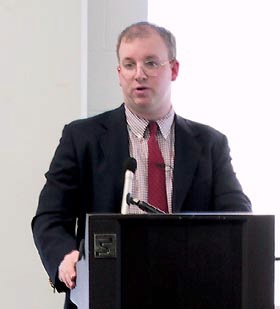|
This is an archived article.
For the latest news, go to the Advance
Homepage
For more archives, go to the Advance Archive/Search Page. | ||
|
Fate of
Civil Liberties Discussed
As the U.S. government tries to prevent the horror of another September 11, will personal liberties be held hostage by the newly enacted Anti- Terrorist Act?
"The Justice Department has competing goals," said David Yalof, an assistant professor of political science, who led the discussion. "On the one hand it wants to stop more terrorist attacks from occurring. But it also wants to ensure that it can prosecute terrorists and see those convictions stand up in court." Yalof noted that the American Civil Liberties Union has some "very legitimate concerns" about the bill's implications. Those concerns, he said, are not simply over the wording of the legislation, but about how government officials translate words into actions. He made his comments to an audience of some 50 students and several professors attending the session, which was part of a series of events reflecting on America since September 11. Yalof explained the legislation's key anti-terrorist measures, provided commentary on the measures, and facilitated a group discussion on the issues. "I don't think the Bush Administration has to worry now about the support of the American people for this legislation. People are going to put up with a lot more restraints on their civil liberties now than they did before September 11," he said, referring to the broad new powers to wiretap and search a person's home that could be considered an intrusion of personal privacy, but could also lead to the arrest of suspected terrorists. Yalof said prosecutors might enjoy a period of considerable discretion in applying such provisions, before any judicial reviews over potential abuses of First and Fourth Amendment Rights come before a court. And even then, he said, they may not be overturned. "We have a conservative U.S. Supreme Court and very conservative federal courts," he said. "Right now the courts would be very leery to interfere with the powers of a Commander-in-Chief fighting a war being waged within our own borders." According to Yalof, one especially controversial aspect of the new law concerns the holding of people in custody. "In this country we can hold any one for a day, but then they have to be charged with something," he said. "The new law allows non-U.S. citizens suspected of terrorism to be detained for up to seven days É and Attorney General John Ashcroft argued that such people should be held indefinitely." In lobbying for the legislation, Ashcroft was quoted in the media as saying that "the American people do not have the luxury of unlimited time in erecting the necessary defenses to future terrorist acts." Yalof said the wartime internment of Japanese-American citizens during the early 1940s serves as a "stern warning" against any rollback of civil liberties. Under the new law, broader wiretapping provisions give the government legal authority to eavesdrop on suspected terrorists for an unlimited time. "Terrorists are good about staying on the move, and the current piece of legislation allows them to be wiretapped no matter where they go," he said. The new legislation also allows prosecutors to share information heard in the sacred grand jury room with other agencies. "This is a big deal," said Yalof, "the gathering of information in a grand jury and then using it elsewhere. That's a significant change." The theory that your home is your castle has also been changed by the new legislation, according to Yalof: "Now, a person's home can be searched without telling him or her first." During the question-and-answer session, Yalof was asked about the possible consequences if someone donated a check to a group identified as linked to terrorist activities. "If you're not a citizen and the government finds such a check with your name on it, you could well be deported," he replied. He noted that government officials have identified 46 known terrorist groups worldwide; under the new legislation, a non-U.S. citizen known to have supported any of them would face deportation. Yalof invited those attending the session to return in six months for a reality check of sorts on the issue of government scrutiny. "By then," he said, "we'll have a real handle on the effects of this legislation." Claudia G. Chamberlain |

